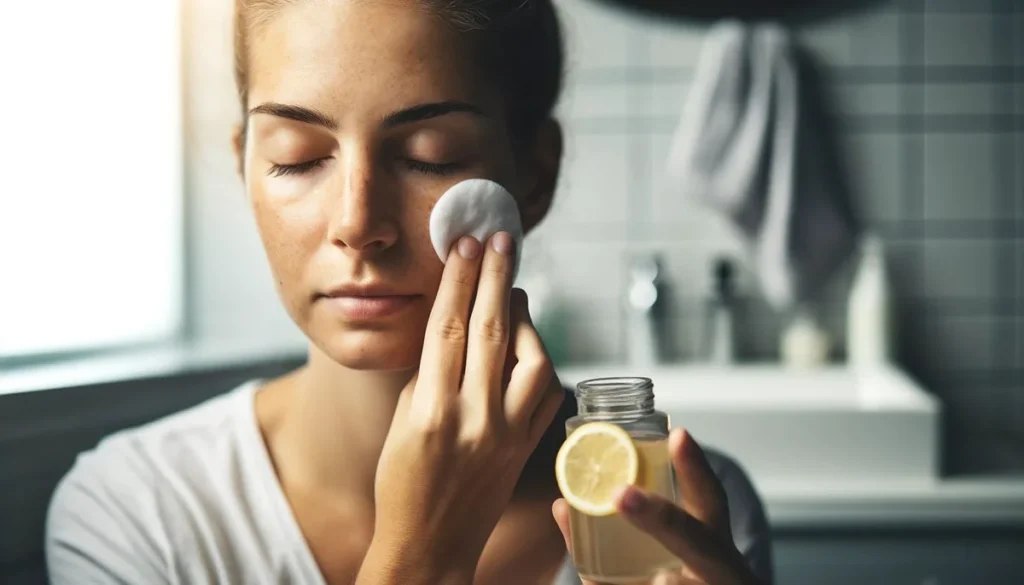Healthwellhealthorganic.com Easily Remove Dark Spots with Lemon Juice
11 min read
wellhealthorganic.com/easily-remove-dark-spots-lemon-juice
INTRODUCTION
Dark spots, also known as hyperpigmentation, are a common skin issue affecting people of all ages and skin types. These marks can result from sun exposure, hormonal changes, aging, and acne scars. While many commercial products are available to treat dark spots, natural remedies are often preferred due to their cost-effectiveness and fewer side effects.
Lemon juice is a popular natural remedy known for its bleaching properties. It is rich in citric acid and vitamin C, making it an effective skin-lightening solution. Wellhealthorganic.com is a reliable source offering detailed guides on using organic and natural ingredients for health and skincare. This article, “wellhealthorganic.com Easily Remove Dark Spots with Lemon Juice,” examines the science and benefits of using lemon juice to remove dark spots, offering practical methods to achieve a clearer, more radiant complexion naturally.
THE SCIENCE BEHIND DARK SPOTS
What Are Dark Spots?
Dark spots, also known as hyperpigmentation, are patches of skin that become darker than the surrounding areas. This discoloration occurs due to excess melanin production, the pigment responsible for skin color. Hyperpigmentation can affect anyone, but it is particularly common among individuals with darker skin tones, as they naturally have more melanin.
Causes of Dark Spots
1. Sun Exposure
Prolonged exposure to the sun’s ultraviolet (UV) rays is a primary cause of dark spots. UV radiation speeds up melanin production as a defense mechanism, leading to sunspots or age spots. Continuous sun exposure without adequate protection can result in persistent and widespread hyperpigmentation.
2. Hormonal Changes
Hormonal fluctuations, particularly those related to pregnancy (melasma), menopause, or the use of birth control pills, can trigger an overproduction of melanin. These hormonal changes can cause dark patches, often on the face, which can be challenging to treat.
3. Post-Inflammatory Hyperpigmentation
Inflammation from acne, eczema, or other skin conditions can increase melanin production as the skin heals. This process results in dark spots or scars that linger long after the initial inflammation has subsided.
4. Aging
As the skin ages, its ability to regenerate and repair itself diminishes, making it more susceptible to accumulating dark spots. Age spots, or liver spots, are common among older adults due to the prolonged effects of sun exposure.
How Lemon Juice Helps
Lemon juice contains high levels of citric acid and vitamin C, which are beneficial for skin lightening and overall health. Citric acid acts as a natural bleaching agent that helps break down melanin, gradually reducing the appearance of dark spots. Vitamin C is a powerful antioxidant that inhibits melanin production and promotes collagen synthesis, which helps in skin renewal and repair.
Furthermore, citric acid’s mild exfoliating properties help remove dead skin cells, allowing for better penetration of other skin-lightening agents. This process not only helps reduce hyperpigmentation but also improves the overall texture and brightness of the skin.
BENEFITS OF LEMON JUICE FOR SKIN

Natural Bleaching Properties
One of the most well-known benefits of lemon juice is its natural bleaching properties. This effect is primarily due to its high citric acid content. Citric acid acts as a natural exfoliant, helping to remove dead skin cells and reduce the appearance of dark spots. When applied to the skin, lemon juice can gradually lighten hyperpigmentation and even tone the skin by breaking down the excess melanin that causes dark spots.
Rich in Vitamin C
Lemon juice is also a rich source of vitamin C, a potent antioxidant that plays a crucial role in skin health. Vitamin C helps inhibit melanin production, reducing new dark spots and lightening existing ones. Additionally, vitamin C promotes collagen synthesis, essential for maintaining the skin’s elasticity and firmness. By boosting collagen production, lemon juice can help improve the overall texture and appearance of the skin, making it look more youthful and radiant.
Antioxidant and Anti-Inflammatory Properties
The antioxidants in lemon juice help fight free radicals and unstable molecules that can damage skin cells and accelerate aging. Exposure to environmental elements like pollution and UV radiation frequently generates free radicals. By neutralizing these harmful molecules, the antioxidants in lemon juice can protect the skin from damage and reduce inflammation. This anti-inflammatory effect can help soothe irritated skin and reduce redness, making it beneficial for those with sensitive or acne-prone skin.
Mild Exfoliation
Lemon juice’s mild exfoliating properties help to remove the top layer of dead skin cells, revealing fresher, brighter skin underneath. This gentle exfoliation can also enhance the absorption of other skincare products, making them more effective. Regular exfoliation with lemon juice can help unclog pores, prevent breakouts, and promote a smoother, more even skin texture.
Moisture Retention
While lemon juice is primarily known for its lightening and exfoliating properties, it can also aid in moisture retention when combined with other ingredients like honey or aloe vera. These combinations can help hydrate the skin and lock in moisture, preventing dryness and improving the skin’s overall hydration levels.
By incorporating lemon juice into your skincare routine, you can use these multifaceted benefits to achieve clearer, brighter, and healthier skin. Whether used alone or with other natural ingredients, lemon juice offers a simple, effective solution for addressing dark spots and improving your complexion.
HOW TO USE LEMON JUICE SAFELY FOR DARK SPOTS

Preparing Lemon Juice for Application
Before using lemon juice on your skin, it is crucial to prepare it correctly to avoid irritation. Freshly squeezed lemon juice is recommended for the best results. Here is how to prepare and use it:
1. Dilution
Pure lemon juice can be too harsh for direct application. Dilute it with equal parts water or rosewater to reduce its acidity and minimize the risk of irritation. This diluted mixture retains its effective lightening properties while being gentler on the skin.
2. Patch Test
Always perform a patch test before applying lemon juice to your face. Apply a small amount of the diluted mixture to a discrete area, such as the inside of your wrist or behind your ear. Wait 24 hours to check for adverse reactions, such as redness, itching, or burning.
Step-by-Step Application
1. Cleanse Your Skin
Start with a clean face. Use a gentle cleanser to remove dirt, oil, and impurities. Pat your skin dry with a soft towel.
2. Application Method
Use a cotton ball or Q-tip to apply the diluted lemon juice directly to the dark spots. To minimize irritation, avoid applying it to the entire face and focus on the areas that need treatment.
3. Leave it On
Allow the lemon juice to sit on the skin for 10–15 minutes. This duration is sufficient for the citric acid to lighten the dark spots without causing excessive dryness or irritation.
4. Rinse Off
After the allotted time, rinse your face thoroughly with lukewarm water. Pat your skin dry gently with a clean towel.
Frequency of Use
For best results, use this treatment once a day. Overuse can lead to skin irritation and increased sensitivity. Consistency is key, so incorporating this into your daily skincare routine will help gradually lighten dark spots.
Post-Application Care
1. Moisturize
Lemon juice can dry out your skin, so it is essential to follow up with a good moisturizer. Choose a hydrating and soothing product to maintain skin balance and prevent dryness.
2. Sun Protection
Lemon juice can make your skin more sensitive to sunlight. Always apply a broad-spectrum sunscreen with at least SPF 30 during the day, even if you use lemon juice at night. This will help protect your skin from further hyperpigmentation and sun damage.
Tips for Sensitive Skin
If you have sensitive skin, further dilute the lemon juice or mix it with soothing ingredients like honey or aloe vera. These combinations can help reduce the potential irritant effects of lemon juice while still providing its skin-lightening benefits.
COMBINING LEMON JUICE WITH OTHER NATURAL INGREDIENTS

Lemon Juice and Honey
Honey is famous for its soothing and antibacterial qualities, making it a perfect match for lemon juice. Honey helps reduce irritation from the acidity of lemon juice while keeping the skin hydrated. To make this mixture:
- Blend one tablespoon of lemon juice with one tablespoon of honey.
- Apply the mixture to the dark spots and leave it on for 20 minutes before rinsing with warm water.
- Use this treatment 2-3 times a week for the best results.
Lemon Juice and Aloe Vera
Aloe vera is known for its healing and moisturizing benefits, which can calm the skin and decrease inflammation. Mixing two tablespoons of aloe vera gel with one tablespoon of lemon juice creates a calming mask that lightens dark spots and keeps the skin hydrated. Apply the mixture to the affected areas, leave it on for 20 minutes, and rinse with cool water. This can be used 2-3 times weekly to keep the skin healthy and glowing.
Lemon Juice and Turmeric
Turmeric is known for its anti-inflammatory and skin-brightening benefits. To make a turmeric and lemon juice paste, mix one teaspoon of turmeric powder, two teaspoons of lemon juice, and one tablespoon of raw milk. Apply the paste to dark spots and leave it on for 30 minutes before rinsing with lukewarm water. This treatment helps improve skin tone and should be used twice a week for the best results.
Lemon Juice and Yogurt
Yogurt contains lactic acid, which helps exfoliate and lighten the skin. Combining one tablespoon of lemon juice with two tablespoons of plain yogurt creates a mask that lightens dark spots and improves skin texture. Apply the mask to the face, leave it on for 20 minutes, and rinse with warm water. Use this mask 2-3 times weekly for smoother, brighter skin.
Combining lemon juice with these natural ingredients can boost its effectiveness while providing extra benefits to your skin. These mixtures target dark spots and nourish and protect the skin, making them an excellent addition to any skincare routine.
PRECAUTIONS AND SIDE EFFECTS
Skin Sensitivity
Lemon juice is highly acidic, which can cause skin irritation, especially for sensitive or dry skin. The citric acid in lemon juice can disrupt the skin’s natural pH balance, leading to redness, itching, and dryness. Always dilute lemon juice with water or mix it with soothing ingredients like honey or aloe vera before applying it to the skin to reduce these risks.
Sun Sensitivity
Applying lemon juice can make your skin more sensitive to the sun, increasing the risk of sunburn and further darkening. This condition, known as phytophotodermatitis, occurs when the skin reacts to citrus compounds after exposure to UV light. To prevent this, avoid sun exposure after applying lemon juice, and always use a broad-spectrum sunscreen with at least SPF 30 when going outside.
Risk of Overuse
Overusing lemon juice can lead to excessive drying and peeling of the skin, which can worsen skin issues. Using lemon juice sparingly and not more than once a day is crucial. Consistent but moderate application is key to avoiding adverse effects while benefiting from its skin-lightening properties.
Patch Test Importance
Before adding lemon juice to your skincare routine:
- Perform a patch test.
- Apply a small amount of diluted lemon juice to a small area of your skin and wait 24 hours to check for any adverse reactions, such as redness or swelling.
- If any irritation occurs, stop using it immediately.
Consultation with a Dermatologist
Consult with a dermatologist before using lemon juice, which is recommended for those with severe hyperpigmentation or sensitive skin. A dermatologist can provide personalized advice and suggest alternative treatments for your skin type.
By following these precautions, you can safely add lemon juice to your skincare routine and minimize the risk of side effects, ensuring a healthier, brighter complexion.
CONCLUSION
Lemon juice is a natural remedy for lightening dark spots and improving skin complexion. Its citric acid and vitamin C content offer significant benefits, including exfoliation, antioxidant protection, and melanin reduction. However, it is crucial to use lemon juice safely and consistently to avoid potential side effects like skin irritation and increased photosensitivity. Combining it with soothing ingredients like honey and aloe vera can enhance its effectiveness while minimizing irritation. Consulting a dermatologist is recommended for those with sensitive skin or severe hyperpigmentation. By following these guidelines, you can naturally achieve a clearer, more radiant complexion.
FAQ SECTION FOR “WELLHEALTHORGANIC.COM EASILY REMOVE DARK SPOTS WITH LEMON JUICE”
1. What causes dark spots on the skin?
Hyperpigmentation, another name for dark spots, results from an excess of melanin, the pigment that determines skin tone. Common causes include sun exposure, hormonal changes, aging, and inflammation from acne or other skin conditions. Sun exposure is a significant factor, as UV rays trigger melanin production to protect the skin, leading to dark spots over time.
2. How does lemon juice help in removing dark spots?
Lemon juice helps remove dark spots due to its high citric acid and vitamin C content. Citric acid is a natural exfoliant that removes dead skin cells and lightens hyperpigmentation. Vitamin C inhibits melanin production and promotes collagen synthesis, aiding skin renewal and reducing the appearance of dark spots.
3. Is it safe to apply lemon juice directly to the skin?
Applying undiluted lemon juice directly to the skin can be too harsh and may cause irritation, redness, or dryness, especially for sensitive skin types. It is safer to dilute lemon juice with water or mix it with soothing ingredients like honey or aloe vera to minimize potential irritation while benefiting from its skin-lightening properties.
4. How often should I use lemon juice to see results?
For best results, use lemon juice treatments once a day. Overuse can lead to skin irritation and dryness. Consistency is key, so incorporating lemon juice into your daily skincare routine will gradually lighten dark spots. Results typically become noticeable within a few weeks to months of regular use.
5. Can lemon juice make my skin more sensitive to the sun?
Yes, lemon juice can increase photosensitivity, making your skin more susceptible to sunburn and further hyperpigmentation. This condition, phytophotodermatitis, occurs when citrus compounds react with UV light. To prevent this, avoid sun exposure after applying lemon juice, and always use a broad-spectrum sunscreen with at least SPF 30.
6. What are some effective combinations of lemon juice with other natural ingredients?
Combining lemon juice with other natural ingredients can enhance its effectiveness and reduce potential irritation. Popular combinations include:
- Lemon juice and honey: Soothes and hydrates the skin.
- Lemon juice and aloe vera: Calms and moisturizes.
- Lemon juice and turmeric: Reduces inflammation and brightens skin.
- Lemon juice and yogurt: Exfoliates and lightens dark spots.
7. Are there any side effects of lemon juice on the skin?
Potential side effects of using lemon juice on the skin include irritation, redness, dryness, and increased sensitivity to sunlight. To minimize these risks, always dilute lemon juice, perform a patch test before use, and avoid applying it to broken or sensitive skin. If irritation occurs, discontinue use immediately.
8. How can I protect my skin while using lemon juice treatments?
To protect your skin while using lemon juice treatments:
- Always dilute the lemon juice.
- Perform a patch test before application.
- Use sunscreen with at least SPF 30 to prevent sun damage.
- Follow up with a moisturizer to prevent dryness.
- Avoid applying lemon juice to broken or sensitive skin.
9. Can lemon juice completely remove dark spots?
Lemon juice can significantly lighten dark spots and improve skin complexions, but it may not completely remove them. The effectiveness depends on the severity of the dark spots and the individual skin type. Consistent use, sun protection, and a proper skincare routine can lead to noticeable improvement over time.
10. When should I consult a dermatologist about dark spots?
Consult a dermatologist if:
- You have severe or persistent hyperpigmentation.
- Over-the-counter or natural remedies, including lemon juice, are ineffective.
- You experience significant irritation or adverse reactions from treatments.
- You have underlying skin conditions that may require specialized care.
A dermatologist can provide personalized advice and recommend professional treatments for better results.



![How to Fix [pii_email_a5e6d5396b5a104efdde] Microsoft Outlook Error?](https://goodnewsetc.com/wp-content/uploads/2023/01/pii_email_a5e6d5396b5a104efdde-pii_email_a5e6d5396b5a104efdde-300x200.jpg)


